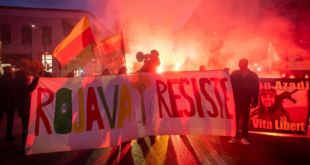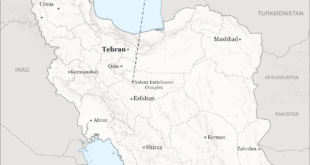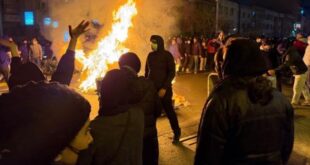Who are Hayat Tahrir al-Sham, the most powerful group in the last province held by rebels in Syria?
The ongoing government offensive against the last rebel-held areas in northern Syria has once again put the spotlight on the jihadist group Hayat Tahrir al-Sham (HTS), the dominant faction in Idlib Province.
Although HTS, formerly known as Nusra Front, continues to pursue a jihadist agenda, it formally split from al-Qaeda in 2016, prompting harsh criticism from al-Qaeda leadership and defections by al-Qaeda loyalists.
Al-Qaeda appears to have given up on HTS returning to the fold. A new group called Hurras al-Din which emerged last year is widely believed to be al-Qaeda’s new branch in Syria.
Despite this, the UN and a number of countries continue to consider HTS as an al-Qaeda affiliate and to frequently use its former name, Nusra Front.
The group itself appears to be trying to strike a balance between maintaining its jihadist credentials and distancing itself from global jihadist groups for the sake of survival.
HTS today is one of the strongest militant factions in northern Syria, having consolidated its power in the region through seizing territory from rival rebel groups in the past two years.
More than cosmetic change
In July 2016, Nusra Front broke ties with al-Qaeda and re-branded as Jabhat Fatah al-Sham (JFS), introducing the separation as an amicable joint decision.
The rebranding followed pressure from Syrian rebel groups who argued that Nusra Front’s link with al-Qaeda was being used as an excuse by the Syrian government and its allies to label the entire insurgency as terrorist.
In January 2017, HTS was founded as a result of a merger between JFS and other factions. The group stressed it was an independent entity, in a clear effort to indicate its separation from al-Qaeda.
In June 2018 HTS reiterated that it had no links with any group after the US blacklisted it as a terrorist organisation.
In October 2017 the head of the former Nusra Front, Abu Mohammed al-Jawlani, was named as HTS leader, having earlier served as HTS’s chief military commander – a role critics said was used to mask his actual leading role in the new formation.
By November 2017, al-Qaeda leader Ayman al-Zawahiri formally denounced Nusra Front’s breakaway saying it marked a “serious violation of a pledge” of loyalty. His statement confirmed speculations from pro-al-Qaeda opinion formers online that al-Qaeda leadership had never agreed to the split.
HTS’s refusal to roll back its decision led to increased tension between HTS and loyal al-Qaeda figures and supporters, which has played out in a nasty war of words online that flares up every now and then.
Matters came to a head after HTS during the same month detained a number of key al-Qaeda loyalists who had previously served as senior officials within Nusra Front.
Several combat units and figures that remained loyal to al-Qaeda subsequently defected from HTS and later joined Hurras al-Din, which was set up in February 2018.
Although HTS and Hurras al-Din are not enemies, they could be seen as rivals competing for territory, weapons and recruits.
Rift with al-Qaeda
Al-Qaeda loyalists accuse HTS of seeking to make gains at the expense of core jihadist principles.
They say the group is secretly working to implement a Turkish agenda in northern Syria that would ultimately rid the region of “true” jihadists and pave the way for a political deal with the Syrian government.
HTS’s suspected links with Turkey has been a key point of contention between it and jihadist hardliners who consider Ankara an enemy that cannot be trusted.
The fact that HTS agreed to Turkey’s set up of observations posts in Idlib and even accompanied Turkish military patrols, as part of a September 2017 political deal, has cemented jihadist hardliners’ suspicion of HTS and their views that it has sold out on jihadist goals.
Another point of contention is the matter of the “disputed weapons”. Al-Qaeda figures argue that HTS owes al-Qaeda – presently represented by Hurras al-Din group – weapons it had when it was under al-Qaeda’s patronage as Nusra Front.
HTS has strongly denied accusations about its “plotting” to undermine the jihadist project in northern Syria, but its religious figures have also argued in favour of a pragmatic approach that would not alienate ordinary Syrians or bring them harm.
But HTS has avoided openly spelling out its position on Turkey, although it has in the past acknowledged the country’s “support” to Syrians, particularly refugees.
Expansionist tactics
HTS has carried out a number of military operations that saw it seize territory from rebel factions, allowing it to consolidate its power in northern Syria.
In July 2017 HTS captured large parts of Idlib Province following battles against rebel groups, including its former ally Ahrar al-Sham.
To address concerns about its growing power, HTS said it would hand over areas under its control to a civilian body. In October, the National Salvation Government (NSG) was born to administer the “liberated areas” in the north.
HTS critics, both mainstream and jihadist, say the NGS is a front for HTS.
In a surprise move in January 2019, HTS seized territory in Aleppo Province, key areas in northern Hama Province and a string of villages in southern Idlib Province following renewed infighting against members of the Turkey-backed alliance, the National Liberation Front (NLF).
Once again, HTS was quick to hand over administrative control to the NSG.
What’s next?
It remains to be seen whether the latest offensive by the Syrian government supported by Russian air force or future ones will bring HTS closer to al-Qaeda fighters, represented by Hurras al-Din.
Similar government offensives in the past year have failed to cause solid collaboration between the two jihadist factions who have preferred to separately fight a common enemy.
The matter also appears to be strongly linked to political agreements, particularly Turkey’s role and whether or not HTS is willing to engage in any deals, secretly or openly.
Following the government advance in Hama countryside in May, al-Qaeda loyalists sought to remind HTS that it could not trust Turkey to safeguard rebel territory against Russian action.
 Eurasia Press & News
Eurasia Press & News


